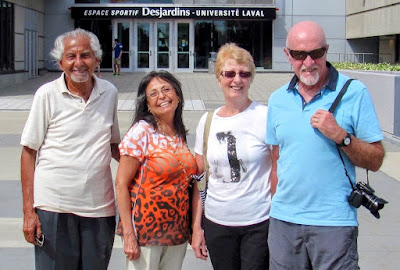October has been dominated by the ever present backdrop of news of the horrors in the Middle East, which I will not dwell on. The awful events in Gaza and Israel have been a huge distraction from media reporting of the ongoing Russian agression in Ukraine, leading to an unfortunate distraction in public interest and faltering aid to President Zelensky's nation.
It has been a fairly busy month for us, in preparation for next week's Flotation '23 conference in Cape Town, MEI's biggest ever conference with 320 delegates having registered before we closed registration last week, the first time in our history.
It is 4 years since our last face to face flotation conference and in my opening remarks at Flotation '19 I noted that for many delegates this would be their first time in Cape Town, one of the world's most beautiful cities, and always near the top of the list of most popular tourist venues.
It was not always so, however. When Barbara and I first set foot in Cape Town 54 years ago, en route to Zambia and the beginning of my long career in the minerals industry, Cape Town was a grim and austere place, visited by relatively few tourists. South Africa was at the height of its egregious apartheid era, with segregation of the races and all the benefits favouring the minority white population.
As I said at Flotation '19 it would have been impossible to predict that 50 years on I would be addressing a sea of faces of all ethnic backgrounds in one of the city's best hotels. South Africa is an immensely complex country, still with major economic and social problems, but the changes have been huge. When we arrived in the Mother City all those years ago the South African rugby team was an international pariah, vilified as a symbol of apartheid with its all-white team composed mainly of Afrikaners. Who could have forecast that half a century later the Springboks would be three times world champions and that a week before Flotation '19, when they became champions for the third time, not only would half the team be black players, but they would be led by a black captain!
Two days ago in Paris the Springboks became world champions again, for a record fourth time, defeating the New Zealand 'All Blacks', also in search of their fourth world championship, in an epic game by a single point, the same margin as in their semi-final against England and their quarter-final against France. And once again they were led by the same captain as four years ago, Siya Kolisi. I'm sure that the celebrations will still be taking place in Cape Town next week!
 |
| Siya Kolisi with the World Cup Trophy Photo: Getty Images |
Despite the approach of Flotation '23 Amanda and family did manage to fit in a two week break in Madagascar, returning to Cornwall only today in preparation for her journey to Cape Town on Friday!
 |
| Amanda and family in Madagascar |
News of the commencement of the new Apprentices Mining Degree at Camborne School of Mines (posting of 20th October) was a poignant reminder that 60 years ago this month a fresh-faced 17-year old just out of school embarked on his long career, enrolled on a metallurgy degree at the University of Leeds. Looking back I remember that I was fairly reluctant to pursue higher education. I had a steady girlfriend and I had been working weekends as a freelance photographer (posting of 29 March 2013) and a full time position as photographer on the local newspaper was available to me on leaving school. In the end I compromised and opted to study physical metallurgy at Leeds, only 30 miles away, and to travel home each weekend to see Barbara and friends and to undertake photographic assignments to supplement my meagre student grant. Time has flown by since!
 |
| Barbara and I (centre) partying in Ashton during my undergraduate days |
 |
| Best, Law and Charlton |
The CSM Apprentices Mining Degree was officially launched by the Princess Royal and it was interesting to see Princess Anne's keen interest in flotation, although she unfortunately did not register in time for Flotation '23.
The Princess Royal follows in the footsteps of her mother, the late Queen Elizabeth II, who visited the School in 1980 and I introduced her to flotation using the same laboratory flotation machine, a Denver Sub-A. I got a great deal of use out of that machine, transporting it around schools in the 1970s to aid recruitment to the degree courses, something desperately needed these days (posting of 20 October).
 |
| Royal visit to CSM in 1980 |
 |
| The same flotation machine at a school in the north of England |
 |
| South Crofty water treatment plant |
 |
| Red River discharging into the sea, 1982 |










































.jpg)

.png)





